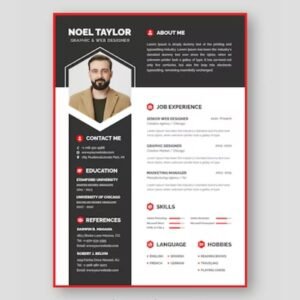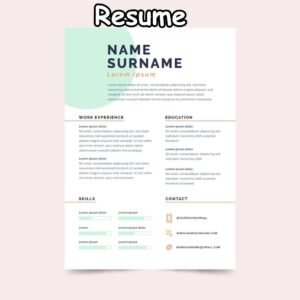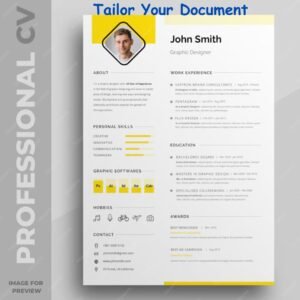What is the Difference Between a Resume and a CV? : A Comprehensive Overview
When it comes to job applications, two documents often come into play: the resume and the CV (Curriculum Vitae). A lot of job seekers in most parts of the world do not know that there is a difference between the two. They use it interchangeably and this has caused a lot of applicants to send CVs instead of resumes and vice versa. So, what is the difference between a resume and a CV?
While both are used to showcase your qualifications and experiences, they serve different purposes and are structured differently. Understanding the distinctions between a resume and a CV can help you craft the right document for your job application needs.
In this blog post, we’ll be looking at the differences between the two in terms of purpose and use, length, content, and geographical and sectoral differences and other differences.
If this is what you are looking forward to reading then let’s get right into it.
Contents
What is the difference between a resume and a CV?
A resume is a concise, tailored document focused on relevant skills and experiences for a specific job. In contrast, a CV is a comprehensive document that details your entire academic and professional history and is primarily used in academic and research settings.
The primary difference between a resume and a CV (Curriculum Vitae) lies in their purpose, length, and content. Here are the key distinctions:
Purpose and Use

Resumes are primarily used when applying for jobs in the private sector, non-profit organizations, and government positions in the United States and Canada. They emphasize your skills, work experience, and achievements that are most relevant to the job you are seeking.
CVs, on the other hand, are commonly used when applying for academic positions, research roles, fellowships, grants, or jobs in the medical field. They provide a more detailed account of your educational background, research experience, publications, presentations, teaching experience, and other academic accomplishments
Resume:
- Purpose: A resume is designed to present a brief, tailored overview of your skills, experiences, and accomplishments relevant to a specific job or industry.
- Use: Commonly used in the private sector in the United States and Canada, a resume is tailored for each job application to highlight the most pertinent qualifications.
CV:
- Purpose: A CV provides a comprehensive and detailed account of your academic and professional history. It is used to showcase your credentials in an exhaustive manner.
- Use: Primarily used for academic, education, research, and scientific positions, as well as when applying for grants or fellowships. It is the standard document in these fields across the globe, and in many countries, it is used for all job applications.
Length

The most significant difference between a resume and a CV lies in their length and format. A resume is typically a concise, one to two-page document. A resume highlights your most relevant work experience, skills, and education. It is tailored to the specific job you are applying for and should be customized for each application.
On the other hand, a CV is a more comprehensive document that provides a complete history of your academic and professional achievements. CVs are often longer than resumes, with no strict length limit, but they are usually around two pages on average. The format of a CV is more flexible and can vary depending on your industry and the specific job requirements.
Resume:
Typically one to two pages long. The goal is brevity, focusing on the most relevant information to the job at hand.
CV:
Can be several pages long. It includes detailed information about your entire academic and professional history without length restrictions. The length grows with your career, as more achievements and experiences are added.
Content

When comparing a resume and a CV, several key differences exist in terms of their content:
Resume:
Structure: A resume generally includes the following sections:
- Summary: This typically includes a professional summary or objective statement at the beginning to highlight key skills and career goals.
- Work Experience: Emphasizes relevant work experience, listing job titles, companies, dates of employment, and key accomplishments in bullet points.
- Skills: Showcases specific skills relevant to the job, often categorized into technical, soft, and language skills.
- Education: Briefly mentions educational background, including degrees, institutions, and graduation dates.
- Certifications: This includes any relevant certifications or licenses that support qualifications for the job.
- Achievements: Highlights notable achievements, awards, or recognitions that demonstrate success in previous roles.
Focus: Emphasizes work experience, skills, and accomplishments pertinent to the specific job being applied for. The information is concise and directly related to the position.
CV (Curriculum Vitae):
Structure: A CV often includes:
- Personal Information: Provides personal details such as full name, contact information, and sometimes a photo.
- Education: Lists academic qualifications in detail, including degrees, institutions, dates, and any relevant coursework or research projects.
- Research Experience: Includes details of research projects, publications, presentations, and conferences attended.
- Teaching Experience: Showcases teaching roles, courses taught, and any educational initiatives undertaken.
- Professional Memberships: Lists memberships in professional organizations or associations relevant to the field.
- Grants and Funding: Details any grants, scholarships, or funding received for research or academic pursuits.
- Publications: This includes a list of published works, articles, books, or research papers authored by the candidate.
Focus: Provides a detailed overview of your entire academic and professional journey, including all relevant accomplishments and experiences. It is a comprehensive record intended to highlight your qualifications extensively.
These content differences reflect the distinct purposes and target audiences of resumes and CVs. Resumes focus on concise, tailored information for specific job applications, while CVs provide a comprehensive overview of academic and professional achievements, particularly in academic, research, or medical fields. Understanding these content distinctions is essential for crafting effective job application documents tailored to the specific requirements of each role.
Geographical and Sectoral Differences

In the United States and Canada:
- Resume: Used for most private-sector job applications.
- CV: Used for academic, research, or education-related positions.
In Europe, Asia, and other parts of the world:
- The term CV is often used interchangeably with a resume, and a CV-like document is standard for most job applications. These documents combine elements of both resumes and traditional CVs, adjusted to local customs and expectations.
Tailoring Your Document

Resume:
- Customization: Each resume should be customized to match the job you are applying for. Highlight the most relevant experiences and skills that align with the job description. This might involve reordering sections, emphasizing different experiences, and using keywords from the job posting.
CV:
- Consistency: While a CV can be updated with new information, it generally remains consistent across applications. For specific positions or grants, you might add a cover letter or a brief section at the beginning of your CV to highlight the most relevant aspects of your background.
Other Differences
- Photos: CVs may include a photo, while resumes typically do not.
- Specificity: Resumes should be tailored to each job application, while CVs can be a broader overview of your experience.
- Sections: CVs often include additional sections such as publications, grants, and professional memberships, while resumes focus on work experience and skills.
Summary
In summary, we can now see that a resume and a CV are both important documents in the job application process, but they are used in different contexts and structured differently.
Understanding these differences ensures that you present your qualifications in the most effective way possible, increasing your chances of success in the job market. Whether you’re applying for a position in the corporate world or academia, having the right document can make all the difference.
Remember to tailor your resume or CV to the job requirements and the local conventions of the country or industry you are applying to.


leave your comment